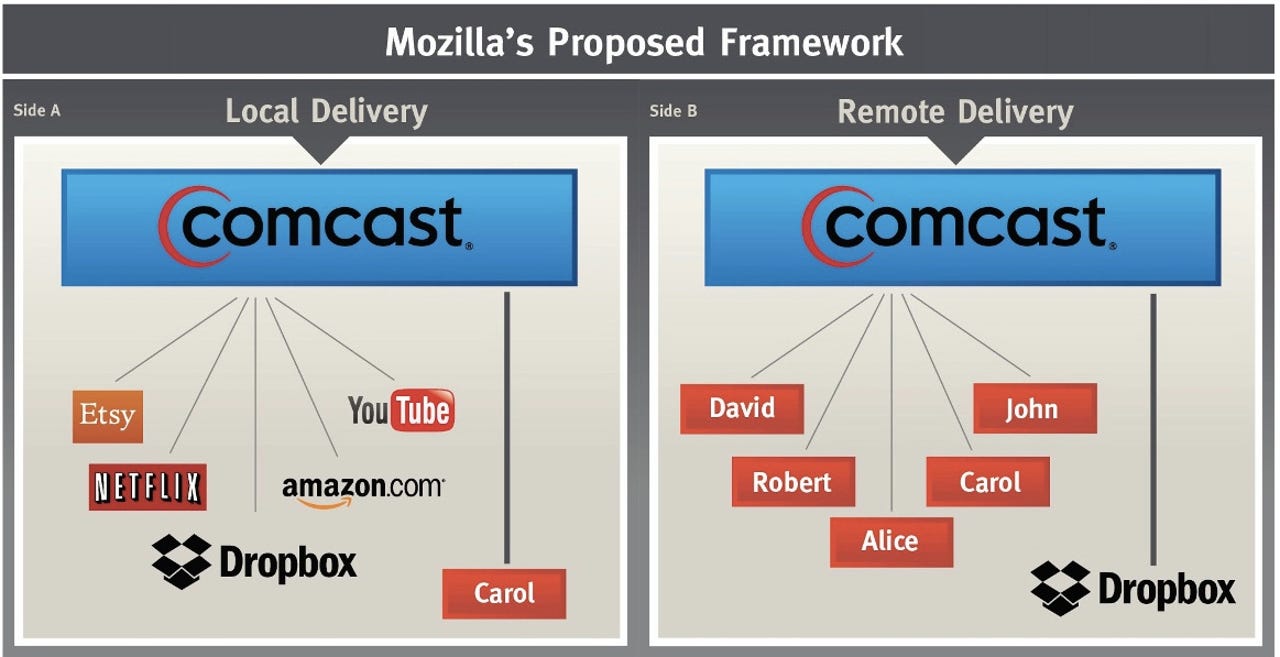Tech giants fight for net neutrality


The battle lines are being drawn for the future of the Internet.
Featured
On one side, you have major last mile Internet providers (ISPs), such as Comcast and Verizon, demanding fees from popular Internet services such as Netflix for a fast lane on the Internet. On the other side, more than a hundred technology companies, including giants like Amazon, Facebook, Google, Microsoft, and Yahoo, recently wrote to the chairman of the Federal Communications Commission (FCC) asking for its support for a "free and open Internet."
It's not just the technology powerhouses that want net neutrality. The Ammori Group, a Washington DC-based public policy law-firm, which organized this lobbying effort, said the letter was "entirely driven by the small companies and the mid-sized companies."
It added that over 100 small companies signed letter before it included a single Silicon Valley technology titan.
"This letter reflects the beliefs of a wide range of companies, from the smallest, least resourced companies to the largest companies, that an unequal Web would stifle innovation, entrepreneurship and free expression," the group added.
Ammori and its allies stated:
"According to recent news reports, the Commission intends to propose rules that would enable phone and cable Internet service providers to discriminate both technically and financially against Internet companies and to impose new tolls on them. If these reports are correct, this represents a grave threat to the Internet.
Instead of permitting individualized bargaining and discrimination, the Commission’s rules should protect users and Internet companies on both fixed and mobile platforms against blocking, discrimination, and paid prioritization, and should make the market for Internet services more transparent. The rules should provide certainty to all market participants and keep the costs of regulation low."
Mozilla, best known for its Firefox Web browser, also signed this letter, but the open-source company also has a more concrete plan for network neutrality.
In an earlier letter to the FCC, Mozilla's senior policy engineer Chris Riley wrote that the company is "asking the FCC to modernize its understanding of Internet access services, and apply its statutory authority for Internet data delivery services in a consistent and complete way."
He added that the FCC would be able to "shift its attention from authority questions once and for all," rather than adopting rules prohibiting blocking and discrimination online.
Mozilla is asking the FCC to re-categorize remote delivery services as telecommunications services. This, according to Riley, would be consistent with the guidelines set by both Congress and the U.S. Court of Appeals in Washington D.C., and, "would give the FCC ample ability to adopt and enforce meaningful net neutrality."
Specifically, Mozilla proposed:
- "Last-mile, terminating access Internet routing is currently understood to include one type of commercial relationship: between an Internet provider and an end-user, connecting the end user to all Internet sites. We are challenging that understanding and proposing a modernization."
- "We ask the FCC to recognize that technological evolution has led to two distinct relationships in the last mile of the network: the current one, between an ISP and an end user, which is unchanged, plus a “remote delivery” service offered by an ISP to an edge provider (Dropbox, in the image), connecting the provider to all of the ISP’s end users."
- "In the key to our argument, we then ask the FCC to designate remote delivery services as telecommunications services under Title II of the Communications Act."
Because there has been some confusion on these points, Mozilla updated its posting to state that the petition asks the FCC to designate, not reclassify, remote delivery services as telecommunications services, because it wouldn't reverse existing precedents.
Mozilla also said it's not asking the FCC to apply the Title II code to peering and interconnection. And, it would not impose obligations on tech companies, and would safeguard them by "clearly delineating services."
In a phone interview with ZDNet, Riley said: "We have the same goals at the end of the day. We want clear rules, and the same rules for wireless and landline Internet. We're on a parallel track with the Ammori letter. The former describes the destination, the other is a road map."
Net neutrality has a history as long as the commercial Internet.
Before 1991, before Google, Facebook and Twitter — even before the Web, you couldn't do anything business-related on the Internet. Then, the National Science Foundation (NSF) decided to allow Advance Network and Services (ANS) to put commercial traffic on the NSFNET Backbone Service, part of the early-'90s Internet.
Soon thereafter, three companies, PSINet, UUNet, and CERFNet, formed the Commercial Internet Exchange (CIX) and by 1992 its commercial traffic was being integrated with the academic and government Internet and the Internet most of you know was well on its way to being born. One of its guiding principles was the concept we now know as net neutrality—that no sites would be blocked and no traffic would be metered or slowed.
Let's hope that we can return to the days of true net neutrality.
While some people doubt that FCC chairman Tom Wheeler is open to such suggestions. Riley believes that Wheeler, and the FCC, may very well come to a new policy statement by the end of the year that will truly support net neutrality.
Let's hope Riley's right.
Related stories: